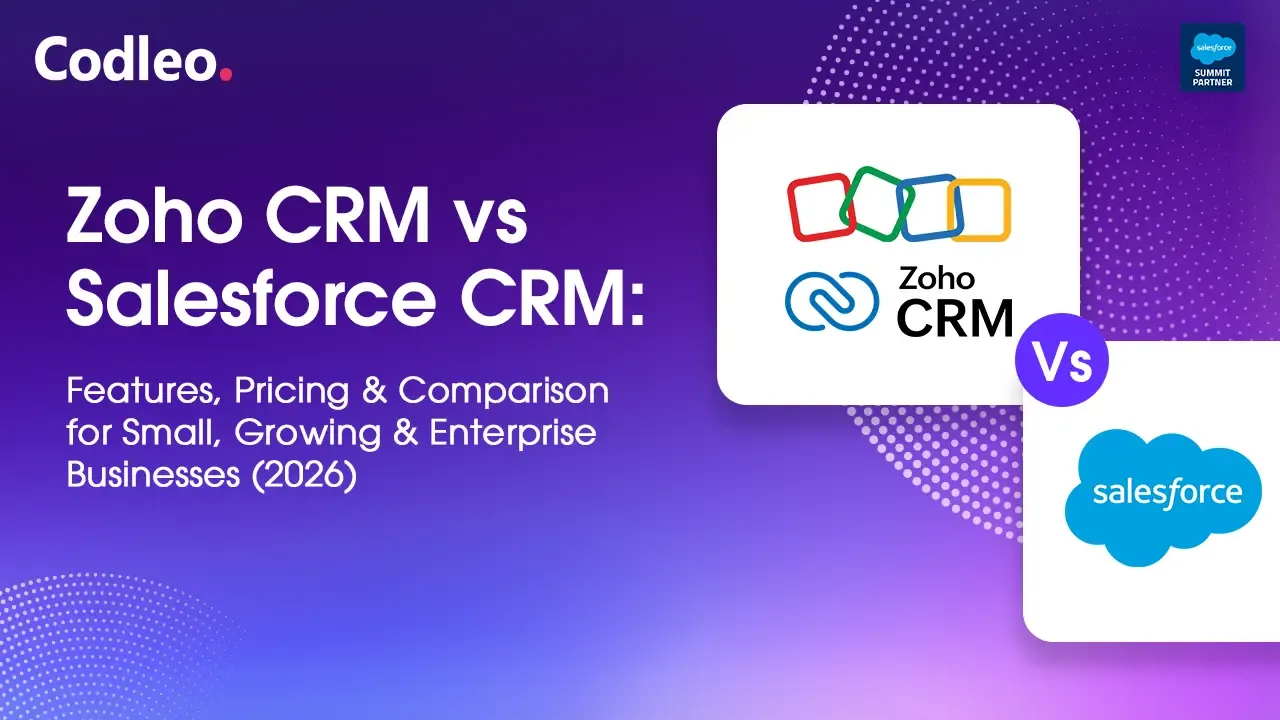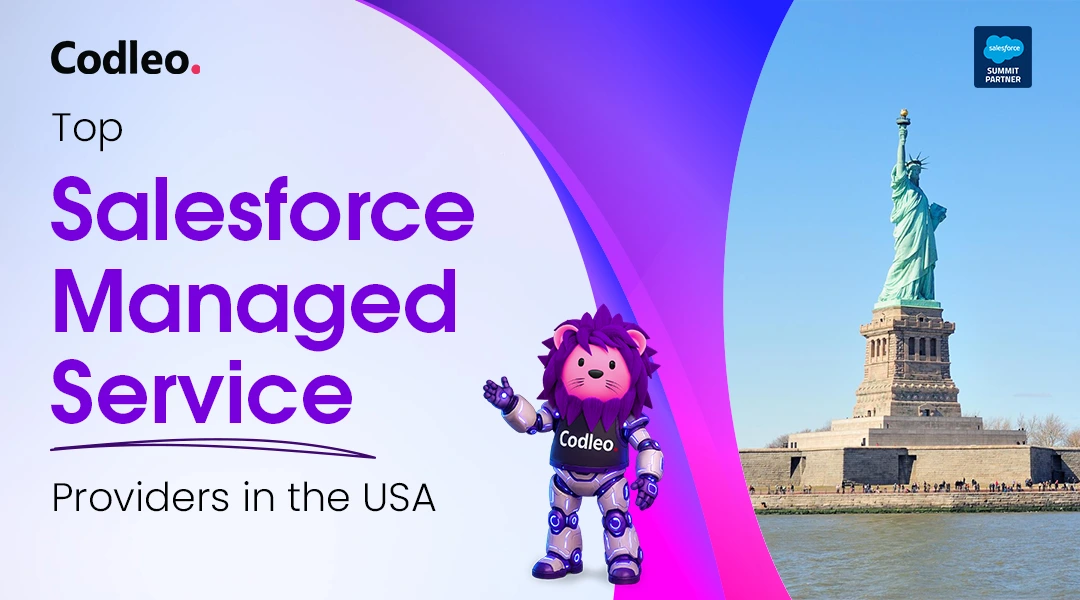
Useful Tips To Consider For Hiring Salesforce Developers

In today's competitive business landscape, leveraging modern technology is crucial. A Customer Relationship Management (CRM) system, like Salesforce, can transform your business if used correctly. To get the most out of it, you need skilled Salesforce developers.
A Salesforce development company can create custom solutions that fit your business needs, ensuring the CRM system works perfectly for you. Their expertise can greatly impact your company's growth and success. However, finding the right talent can be challenging.
This blog will guide you on how to hire the best Salesforce developers for your needs. We'll cover everything from checking certifications and technical skills to evaluating their experience in your industry.
These tips are useful for recruiters and business owners who want to build a strong Salesforce team. By following our advice, you can make better hiring decisions and take your projects to the next level. Let's explore the key factors to consider when hiring a top-notch Salesforce developer.
Why are Salesforce Developers in Demand?
Salesforce dedicated developers are in high demand for several reasons. The platform's growing popularity among companies looking to implement CRM systems (Customer Relationship Management) and other applications is a key factor.
Let's explore why Salesforce developers are so sought after in detail.
Salesforce Market Dominance and Popularity
Salesforce is one of the leading CRM platforms globally, holding a significant market share. Companies of all sizes and industries use it to manage customer relations more efficiently, streamline processes, and drive growth. As more businesses adopt Salesforce, the need for skilled developers continues to rise. Its popularity is set to increase as more enterprises integrate its use into their operations.
Integration and Customization Needs
Salesforce offers a high level of customization and flexibility, allowing businesses to tailor the platform to their specific needs. Salesforce developers are essential for this, as they customize Salesforce to meet unique business requirements.
Salesforce developers create custom fields, objects, and workflows. They also integrate Salesforce with other systems, like ERP or marketing automation platforms. This capability is crucial for businesses aiming to optimize their Salesforce usage. Effective integration and customization are key to unlocking Salesforce's full potential.
AppExchange Ecosystem
Salesforce's AppExchange is an online marketplace for third-party integrations and applications that extend its functionality. Companies often hire Salesforce developers to create custom apps tailored to their business needs. These developers are vital for building and managing these apps, which can include industry-specific tools and data analytics dashboards.
Workflow Automation and Optimization
Salesforce provides powerful automation tools, such as workflow rules and flows. Developers automate processes and reduce manual tasks by creating custom triggers and enhancing data handling on the platform. Many businesses hire Salesforce developers to improve their workflows, saving time and money through enhanced automation.
The Demand for Certified Professionals
Salesforce offers various developer certifications, such as Salesforce Certified Platform Developer. These certifications help employers assess a developer's skills and knowledge, making certified professionals more attractive hires.
Many companies prefer hiring Salesforce-certified developers because they have a deep understanding of the platform and best practices. The demand for Salesforce developers has grown due to the increasing need for certified professionals.
Data and CRM Management
In today's data-driven business world, effective customer relationships and data management are crucial. Salesforce developers configure and manage customer data on the platform to ensure its accuracy and security. They also build data models and design data architecture, handling large datasets efficiently. Salesforce developers must be skilled in data management and utilization, which is a vital asset for any business.
Mobile Development
Salesforce enables businesses to create mobile applications for sales teams and customer service representatives. Companies seek developers with mobile app development skills on the Salesforce platform to provide their staff with the tools they need for productive work. Creating custom mobile apps requires specialized skills.
Updates and Innovations
Salesforce constantly adds new technologies and features to its platform. Developers must stay updated on these changes to make the most of them for their organization. In this fast-paced environment, Salesforce developers need to be flexible and eager to learn continuously. This adaptability is highly valued by employers looking for innovative solutions.
High Earning Potential
Salesforce developers are among the highest-paid professionals in IT. Companies are keen to attract and retain top talent because of their expertise. The potential for high earnings makes Salesforce development an attractive career.
Diverse Industry Applications
Salesforce is used in many industries, including finance, healthcare, and manufacturing. This wide application allows developers to find work in various fields, making their skills more adaptable and valuable. Experienced developers in a specific sector can command higher salaries due to their specialized knowledge.
Tips for Hiring Salesforce Developers
Here are some essential tips to keep in mind when hiring Salesforce developers:.
Tip 1: Define Your Requirements
Before you start the recruitment process, clearly define the scope of your project and the role the developer will play. Describe their needed skills and experiences. Do you need someone for a single customization, or do you require a full-time developer to manage your Salesforce instance? Knowing your requirements helps create an accurate job description and find qualified candidates.
Tip 2: Select the Right Type of Developer
There are different kinds of Salesforce developers, each with specific skills:
-
Salesforce Administrators: They configure Salesforce, manage user access, create dashboards and reports, and ensure Salesforce aligns with business processes.
-
Salesforce Developers: These experts handle coding, programming, and customizing Salesforce. They create integrations, automation rules, and custom applications. Hire a developer if your project requires complex customizations.
-
Salesforce Architects: They have deep knowledge of Salesforce and design complex solutions. They create the architecture for Salesforce implementations. Understand these roles and hire the developer that fits your project needs. You might need a mix of these roles for a successful Salesforce deployment.
Tip 3: Evaluate Technical Skills
Ensure developers have the technical knowledge for Salesforce. Look for skills in:
-
Salesforce Development Languages: Candidates should know Apex and Visualforce.
-
Lightning Platform: Experience with Lightning components and building user-friendly interfaces is essential.
-
Database Skills: A solid understanding of SQL, database principles, and design is beneficial.
-
API Integration: Knowledge of REST APIs and SOAP is crucial for integrating Salesforce with other systems.
-
Certifications: Salesforce certifications, like Salesforce Certified Platform Developer, validate a candidate's skills.
-
Version Control: Familiarity with Git is important for collaboration and code maintenance.
Assess these skills through technical questions, coding challenges, or reviewing past Salesforce projects.
Tip 4: Consider Past Experience and Projects
Experience is valuable. Look for candidates with proven success in Salesforce projects. Consider:
-
Years of Experience: While not the only indicator, it can show familiarity.
-
Project Diversity: Developers with varied Salesforce project experience are more adaptable.
-
Industry Knowledge: Experience in your industry is a plus.
-
Client References: Ask for references to understand their communication and problem-solving skills.
-
Portfolio: Request a portfolio to assess their work quality.
Tip 5: Evaluate Soft Skills and Cultural Fit
Consider soft skills and cultural fit. Salesforce developers work with various teams, so they need to communicate effectively and understand business processes. Key soft skills include:
-
Communication: Explaining technical concepts to non-technical team members is crucial.
-
Problem-Solving: Ability to tackle complex challenges and find creative solutions.
-
Teamwork: Collaboration skills are essential.
-
Adaptability: Willingness to learn and adapt to new technologies and features.
-
Customer-focused: Understanding the value of a good customer experience is important.
Cultural fit is also vital. Developers who share your company's values will integrate more smoothly.
Tip 6: Use Salesforce Community Resources
Leverage the active Salesforce community:
-
Salesforce Trailblazer Community: A hub for information, discussions, and resources. Seek advice or recommendations.
-
Salesforce User Groups: Join local or online groups to connect with professionals and potential candidates.
-
Salesforce Forums and Blogs: Stay informed about industry developments.
-
Salesforce Partners: Collaborate with consultants and contractors who are Salesforce experts.
Tip 7: Conduct Thorough Interviews
Interviews help you learn about a candidate's abilities and fit. Use these methods:
-
Technical Interview: Include questions or challenges to test Salesforce development skills.
-
Scenario-Based Questions: Ask candidates how they would handle real-life problems in your project.
-
Behavioral Interview: Explore past experiences and how they managed challenges and worked with others.
-
Culture Fit Interview: Assess soft skills and alignment with company values.
-
Skills Test: Assign a simple Salesforce task to evaluate practical skills.
-
Reference Checks: Contact references to learn about past work experiences and performance.
Tip 8: Leverage Online Platforms
Use online resources to find Salesforce developers:
-
Job Boards: Post openings on specialized job sites and boards.
-
Freelance Platforms: Sites like Upwork or Freelancer offer short-term project developers.
-
Social Media: Announce job openings on platforms like LinkedIn, Facebook, and Twitter.
-
Recruitment Agencies: Partner with agencies specializing in Salesforce and technology recruitment.
Tip 9: Provide Competitive Compensation
To retain top talent, offer competitive salaries. Research industry standards and salary ranges for Salesforce developers in your area. Include benefits like healthcare, bonuses, and professional development opportunities.
Tip 10: Create Opportunities for Growth
Top developers seek growth and learning opportunities. Provide a clear career path, access to certifications and training, and ongoing skill development. Developers who see a future with your company are more committed and contribute to success.
Tip 11: Evaluate Problem-Solving Ability
Salesforce developers often face complex problems. Present candidates with real-life or hypothetical scenarios during the interview. Ask how they approach problem-solving and troubleshooting issues to gain insights into their analytical and critical thinking abilities.
Tip 12: Stay Updated on Salesforce Trends
Salesforce evolves with new updates and features. Developers should stay informed about the latest advancements. Being up-to-date with Salesforce trends is essential for effective development.
Tip 13: Onboard Effectively
After hiring a Salesforce developer, ensure a successful onboarding. Provide thorough training on your company's Salesforce setup and processes. Access to resources, documentation, and mentoring helps new team members integrate smoothly.
Tip 14: Monitor Performance
Regularly review the performance of Salesforce developers to ensure they meet expectations and contribute effectively to your project. Provide constructive feedback to help them improve.
Tip 15: Attend Salesforce Events and Network
Attend Salesforce events like Dreamforce and regional Salesforce World Tours. Networking with professionals and developers can provide valuable connections and hiring recommendations.
Conclusion
Salesforce developers have high earning potential and are needed across various industries. As Salesforce expands, the demand for skilled developers will continue to grow. Hiring the right Salesforce developer is crucial for maximizing your Salesforce implementation. The competition for top talent is intense, so a careful and strategic hiring approach is necessary.
Remember, finding the right developer takes time and effort, but the rewards are worth it. Your Salesforce development team will be instrumental in achieving your business goals and shaping your CRM strategy for the future.
Contact us today! Our Salesforce experts are ready to help with your specific business needs.
Latest Blog
Say "hello" to us and lets gets talking
Partner with the best team in the world for your CRM or other digital needs.
Contact Us




